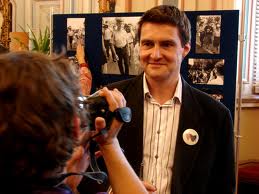 Same-sex marriage is for Gillard what the republic was for Howard.
Same-sex marriage is for Gillard what the republic was for Howard.
By opposing these reforms and defending “tradition” both leaders tried to provide the nation with a point of stability and continuity.
Each caused the nation discomfort and unease, Gillard with her far-reaching carbon tax and Howard with his radical consumption tax.
Marriage and monarchy have provided each leader with a counterweight to the profound changes they wrought.
But popular opinion has not been on their side.
Under Howard a majority supported an Australian head of state.
Under Gillard a majority believes same-sex couples should be allowed to marry.
Howard and Gillard’s response has been to appear magnanimous to those who disagree with them while cunningly ensuring they get their own way.
Howard allowed a referendum on a republic but rigged the questions so republicans split and the monarchy remained.
Gillard has “moved forward” to supporting a conscience vote for her party, but she assumes that arch-conservative Tony Abbott is unlikely to do the same and therefore any vote to allow marriage equality will be lost.
Unfortunately for Gillard, that’s where the parallel ends.
There are critical differences between same-sex marriage and the republic that means Gillard’s strategy will fail.
Marriage equality is about the day-to-day struggles and aspirations of tens of thousands of Australians who are increasingly integrated into general society.
It is concrete, immediate and real in a way the selection of the head-of-state can never be.
From this flows the second difference: changes in attitudes to same-sex marriage are rapid, profound, from the ground-up and relatively irreversible.
At the last election not one sitting Labor MP was willing to publicly declare their support for marriage equality.
Now it is utterly unremarkable for ministers, state Labor leaders, state Labor conferences and even state Labor governments to loudly and proudly declare themselves for reform.
This change has occurred entirely because of the advocacy of ordinary people and despite the trenchant opposition of political leaders.
Such quick, bottom-up change is now stirring in the Liberal Party.
For all his tough-man image, it’s hard to see how Tony Abbott can stand in the way.
When (not if) Abbott allows a conscience vote, Gillard’s clever strategic retreat to a conscience vote will be far less strategic than she expected it to be, and far more of a defeat.
The other critical difference between Howard’s defence of the monarchy and Gillard’s defence of “traditional” marriage is that Howard believed in the institution he was defending, or at least his support for it was believable.
After reading all of Gillard’s statements on this issue and after speaking to those who have talked to her about it, I am convinced she doesn’t believe in marriage at all, for anyone.
I fear she still holds to a 70s feminist critique of marriage as patriarchal institution that will wither away, despite the fact that marriage is now a far more equitable institution than it once was and shows no sign of disappearing.
Politically, her low esteem for marriage means she has no interest in reforming the institution and no problem abandoning it to the religious right to win their support.
If I’m right, it is depressingly cynical that the champion of those who want to protect marriage from same-sex couples is someone whose ideological opposition to marriage is far more of “threat” to the institution than these couples could ever be.
But even if I’m wrong about Gillard’s real views, her trenchant defence of the traditional “meaning and standing of marriage” is not believable coming from an unmarried atheist.
As much as lobbyists like Jim Wallace might praise her, grassroots religious conservatives will continue to be suspicious of her.
Just as a conscience vote will win her no support among supporters of marriage equality, her opposition to that reform will not win her respect in the religious right.
The republic was a winner for Howard, gaining him undying support of monarchists without greatly alienating the middle ground.
Marriage will be a loser for Gillard because her cynical compromise pleases no-one and convinces no-one.
There was more than a little irony in the headline of Gillard’s op-ed on the ALP National Conference in which she announced her support for a conscience vote: “An opportunity for sound and fury signifying something.”
In its original context, that phrase, from Shakespeare’s Macbeth, perfectly sums up the cynicism, foolishness and futility of Gillard’s opposition to marriage equality:
“Life’s but a walking shadow, a poor player, that struts and frets his hour upon the stage, and then is heard no more. It is a tale told by an idiot, full of sound and fury, signifying nothing.”
This article was originally published on the ABC, Drum, website
